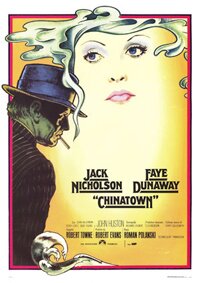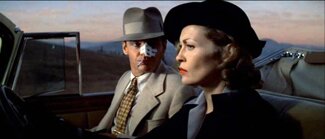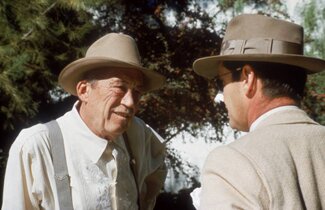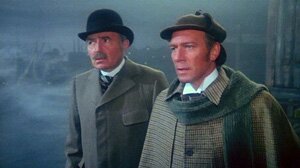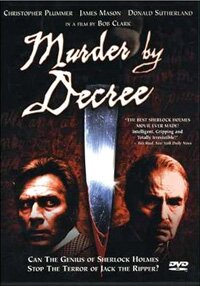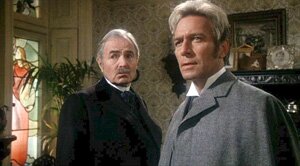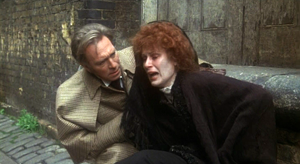It’s Day 5 of For the Love of Film (Noir) — don’t forget to or use the button on the right. And if you are interested in boatloads of great links to musings on film noir and its films, scroll down this page at Self-Styled Siren or over at Ferdy on Films. This is wonderful material! (Also see today’s Blogathon Notes.)
One of the few things I’m certain about with the movies that started this whole film noir business, movies from the forties and fifties like The Big Heat, Double Indemnity, or Gilda, is that they were not aware of themselves as being in a genre called film noir. They might have thought of themselves as B-movies, crime movies or pulp, but not film noir. Categorization like that always comes after the fact.
But once an approach or style is identified, like film noir, subsequent movies taking that approach are self-aware. They see themselves as film noir and inevitably try to replicate the approach. They may try to do much more, but they can’t be made the same way as the original film noirs were. Awareness affects what is being created.
Just as you can’t see the same movie twice (not in the same way), you can’t make the same kind of movie twice. But you can come damn close!
Chinatown (1974)
Directed by Roman Polanski
Chinatown, a wonderful movie, is an example of what a script can do for a film.
It’s like finding the right music at a party. Someone feels compelled to dance, then another and another. Soon, everyone’s up dancing. And dancing well.
In Chinatown, just about every artist is dancing their damnedest because the script has pulled them onto the floor. Director, actors, lighting people, costume designers … they’re all performing at their highest level.
It’s Robert Towne’s script that has done this.
One of Roman Polanski’s great talents is creating mood and few films do it so well and so quickly as the opening of Chinatown. I can’t think of many movies I would watch simply to see the opening credits but the look and the marvellous music of the introductory credit sequence is just so good with its period lettering and sepia tone (which carries through the movie), that you’re hooked even before the movie has presented its opening shot.
Modelling itself on the film noir style (particularly films like Howard Hawks’ movie The Big Sleep), the film’s mystery is created by presenting the story through the eyes of detective Jake Gittes, the Jack Nicholson character. We know what he knows, we’re puzzled by what he’s puzzled by, we’re misled by what misleads him. In fact, just as Bogart was in just about every scene of The Big Sleep, Nicholson is in just about every scene in Chinatown, either as a participant or as an observer.
But the film isn’t dependent on Nicholson. Faye Dunaway is perfectly cast as the enigmatic, and troubled, Evelyn Mulwray. It’s hard to imagine anyone else but Dunaway in that role. The movie is also bolstered by brilliant supporting performances, particularly John Huston as Noah Cross.
I also love the leisurely way the movie unfolds. Unlike the quick cuts and thrumming soundtrack of most current movies, Polanski takes his time. And it works so well. This may be the reason why it works. You’re seduced by the mood, and become involved with the characters, and thus the story.
Chinatown is a great, fascinating movie that illustrates the importance of beginning with a great script.
With the DVD … it’s okay. Not great, could be a lot better, but adequate. It’s largely clean and clear, but certainly not on the pristine level.
This is partly due to it being an older film (1974). For extras, there is really just one (I don’t count trailers as extras).
There is a documentary of sorts. It features interview clips with director Roman Polanski, writer Robert Towne, and producer Robert Evans.
There are some interesting comments, but there is really no depth to it … Par for the course with DVD extras.
(Note: This was written more than 10 years ago. The DVD comments refer to an early DVD release. The movie has since been released in a “special edition” which, I believe, is an improvement.)

